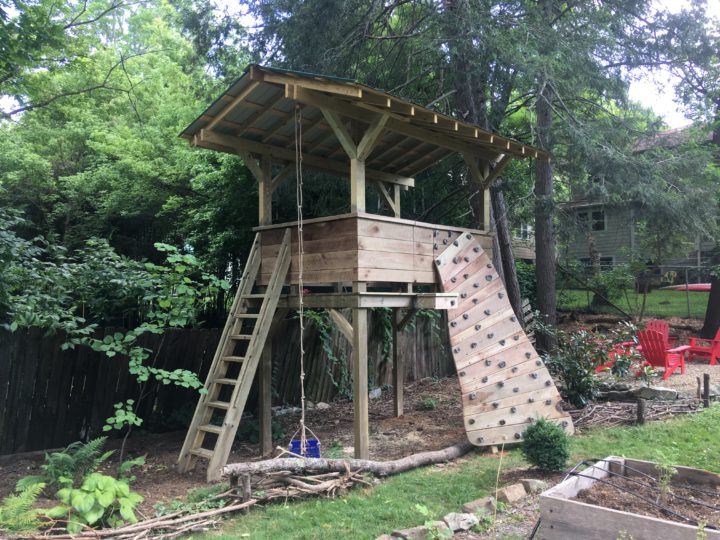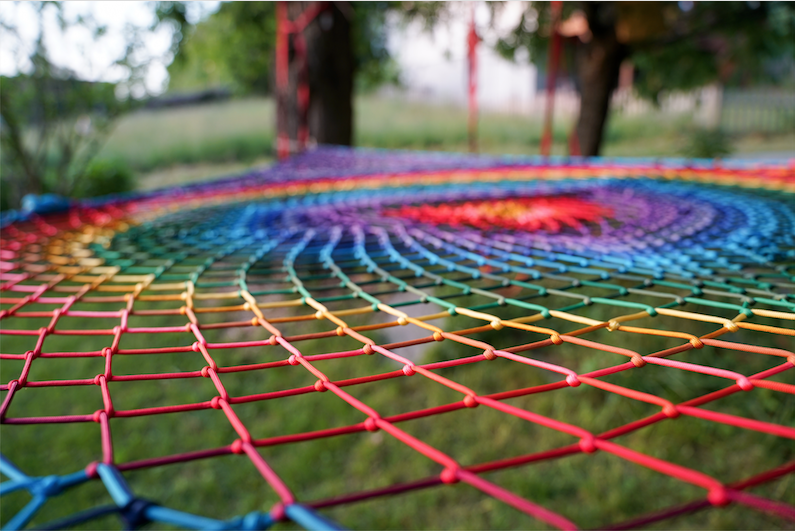While an undisputed highlight of living in Western North Carolina is proximity to the great outdoors, there’s something to be said for one’s own backyard. (Better bathroom facilities, for one.)
Chances are that during the COVID-19 pandemic, many families have spent more time outside than usual. This year, the best holiday gift might be a backyard upgrade — adding a treehouse, tree fort, tree swing or funky, psychedelic-colored Tree Weave. Or, if one’s pockets are very deep, a luxury treehouse.
No need to find a YouTube tutorial. There’s a burgeoning WNC industry of builders, weavers and other creatives aiming to make local trees as special as possible.
‘Magical encounters’
Most people with trees on their property only have a few that are the right size and structure for a treehouse, explains Mark Craven, founder of Liminal Feats.
“The primary factors in determining the trees [to build in] are the health and vigor of the tree, so that it can adapt to the new loads and forces you’re putting on it,” he explains. Some trees, or clusters of trees, have wide enough trunks to support treehouses by themselves. Other trees may need posts or a supplementary foundation.
Liminal Feats mostly designs treehouses for children, so Craven likes to get wish lists before starting a project. The most popular request is adding a manual dumbwaiter: a “milk crate tied on the rope through a pulley so they can hoist their stuff up there,” he explains. Dumbwaiters are easy to install, and kids seem to love them.
Trapdoors, climbing ropes and slides are other add-ons Craven offers. He steers people away from installing backyard zip lines, as he believes zip lining should have professional oversight. He can also add windows and doors for a four-season treehouse.
Typical costs range between $5,000 and $10,000, Craven says. But if a treehouse isn’t in the budget or Mother Earth’s plans, Liminal Feats also builds tree forts (constructed with supports on the ground, like a playhouse) and tree swings. Craven thinks chair-style swings are more fun than tire swings, and he recommends Lounger hanging chairs from local brand Eagle’s Nest Outfitters.
Craven also consults with families who want to build swings or houses in their trees at home. But he notes that professionals — both builders like him and certified arborists whom he often mandates for projects — are safer.

“It’s pretty easy to throw a rope over a branch and make a swing,” he says. “But if the tree has health issues that you weren’t able to diagnose, or if the rope that you bought from Home Depot was not adequate to be left outdoors all the time, that rope’s going to fail eventually. And it’s probably going to fail when there’s someone swinging on it.”
Craven began his career in 2009 at Navitat Canopy Adventures, a zip line tour operator in Barnardsville. But a desire to be more present as a parent led him to embark on his own business using the skills he’d learned in the outdoor challenge industry.
“I’ve had so many magical encounters in the forest, in the wilds and with trees,” he says. “And I want other people to have those experiences, too.”
‘True monkeys’
River Echeverria describes a Tree Weave as “a very elaborate cross between a trampoline and a treehouse — they’re insanely bouncy.” A better explanation may be to call Tree Weaves rainbow spiderweb play structures that nestle amid tree limbs like giant hammocks. (Still confused? Look at the pictures.)
One thing is for sure: Tree Weaves, built by a team led by Echeverria and his partner, Alex Patton, are unique. He was an avid practitioner of slacklining, a sport similar to tightrope walking, in Colorado. “Me and my friends would make these types of tree nets to hang out in the forest, just in spots we would slackline,” Echeverria explains. He got the idea for Tree Weaves from those ropes and, after moving to Asheville, launched the business in 2017.
Tree Weaves have a taut structural perimeter constructed with rope; various colors of paracord, a type of nylon, are tightly woven inside. Unlike the solid structure of a treehouse, Tree Weaves move with the motion of those playing on them. The company can weave an installation into almost any tree, Echeverria says, and if a property is treeless, it can install posts.
“They’re just bouncy play structures where kids can be true monkeys,” Echeverria says. “These parents are always like, ‘My kids are spending so much time inside. I want them to hang out in our backyard.’”
Installation costs vary widely based on the owners’ request and the size of the trees involved. A smaller Tree Weave, ranging from 6-feet-by-6-feet to 10-feet-by-10-feet, costs $2,000 to $5,000 and can take up to a week to build. A larger weave can cost up to $20,000, and the process — involving up to 600 feet of rope and 20,000 feet of paracord — can take months. The average budget is $8,000, Echeverria says.
A Tree Weave contains colored rope and a choice of more than 50 color options for paracord. “We do a lot of installations where we’ll do random color combinations, like turquoise and lavender, or like mustard yellow and maroon, or all six shades of purple that are available,” Echeverria explains. Occasionally, clients request green or brown to blend in with nature, but kids appreciate when the colors are funkier and brighter.
The installations are usually 6 or 7 feet off the ground, enough to seem exciting for kids but still provide a fun hangout spot for adults. “Our mom clients will text me photos of them and their gal pals drinking wine in the net at 3 p.m. while their kids are at school,” Echeverria says with a laugh.
Grown-up clubhouse
Most treehouses are for kids. But one Asheville company builds treehouses for grown-ups. World Treehouses specializes in “luxury, high-end treehouses,” says Erin Everett, the company’s outreach coordinator.
Each treehouse is an original design determined by the trees around it. Everett’s husband, Adam Laufer, is the lead builder, and World Treehouses employs a team of handcrafters with backgrounds in custom furniture-making to create what she calls “art in the trees.” Construction typically costs $500 to $1,000 per square foot, she says, with total costs often reaching several hundred thousand dollars.
Laufer and his team can add steel-engineered hardware, or “artificial limbs,” in trees to hold an increased load. Depending on the tree’s location, the treehouse can have electricity and plumbing installed by the team’s contractors. Some clients place them adjacent to an existing house or cabin to serve as an office or artist’s studio — often with a suspension bridge connecting to the main property. (Everett suggests watching the Animal Planet reality show “Treehouse Masters” for inspiration.)
Everett used to own an Asheville publication called New Life Journal, which closed in 2009; Laufer is a former yoga teacher and builder who used to construct zip line courses at Navitat. The couple started World Treehouses in 2016 to encourage more people to enjoy trees.
“[Laufer] loved being in the trees, but he didn’t feel like zip lines were the way to connect with trees,” Everett says. Their hope was to make treehouses be “a place where you can meditate with the trees and sleep in the trees,” she explains.



Before you comment
The comments section is here to provide a platform for civil dialogue on the issues we face together as a local community. Xpress is committed to offering this platform for all voices, but when the tone of the discussion gets nasty or strays off topic, we believe many people choose not to participate. Xpress editors are determined to moderate comments to ensure a constructive interchange is maintained. All comments judged not to be in keeping with the spirit of civil discourse will be removed and repeat violators will be banned. See here for our terms of service. Thank you for being part of this effort to promote respectful discussion.